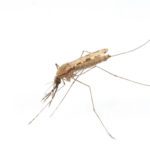Link to Pubmed [PMID] – 12485988
EMBO J. 2002 Dec; 21(24): 6673-80
Deciphering molecular interactions between the malaria parasite and its mosquito vector is an emerging area of research that will be greatly facilitated by the recent sequencing of the genomes of Anopheles gambiae mosquito and of various Plasmodium species. So far, most such studies have focused on Plasmodium berghei, a parasite species that infects rodents and is more amenable to studies. Here, we analysed the expression pattern of nine An.gambiae genes involved in immune surveillance during development of the human malaria parasite P.falciparum in mosquitoes fed on parasite-containing blood from patients in Cameroon. We found that P.falciparum ingestion triggers a midgut-associated, as well as a systemic, response in the mosquito, with three genes, NOS, defensin and GNBP, being regulated by ingestion of gametocytes, the infectious stage of the parasite. Surprisingly, we found a different pattern of expression of these genes in the An.gambiae-P.berghei model. Therefore, differences in mosquito reaction against various Plasmodium species may exist, which stresses the need to validate the main conclusions suggested by the P.berghei-An.gambiae model in the P.falciparum-An.gambiae system.


